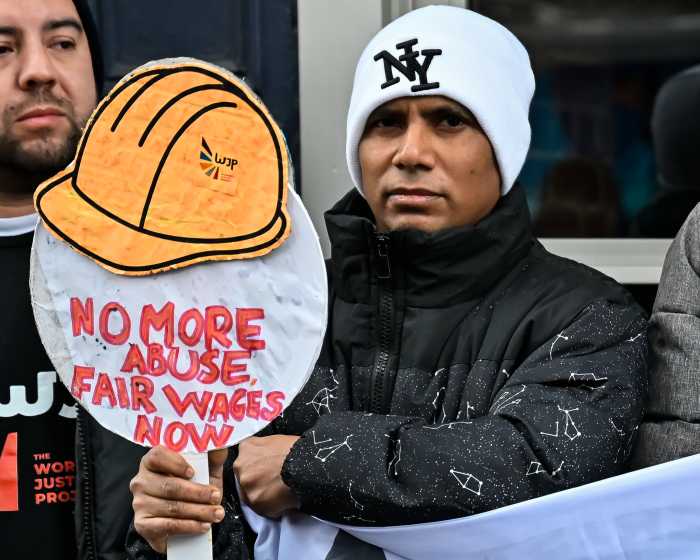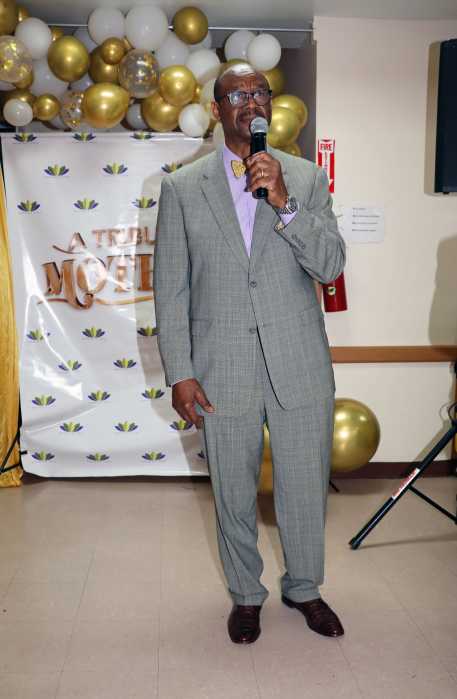Sean Patrick Maloney commits to see his AG run to the finish line
“Look, this is the critical moment for a candidate like me,” Maloney told Gay City News in a telephone interview on Tuesday. “I am not looking for an easy out or a quick fix, and I am staying in this race to the end. I am very proud of the campaign we’ve run.”
Maloney, who turned 40 this summer, entered the race with a background as an investigatory attorney focused on corporate law and four years in the Clinton White House, where he served as staff secretary to the president, controlling the flow of information prepared for executive decisions. An out gay Manhattanite who is raising three children with his longtime partner, Randy Florke, a realtor and interior designer, Maloney has spent more than a year searching for that “critical moment”—an opportunity he has been sure would come because, as he told a crowd of supporters at a January fundraiser on the Upper East Side, “I don’t think that the top guys in this race have closed the deal with the people of New York.”
Looking at the state of the race just one week before the September 12 primary, Maloney said, “One guy is playing it safe, one guy is playing it negative.”
Cuomo, the former Clinton administration housing secretary, has been the frontrunner all along and, in the latest poll, continues to have a double-digit lead over Green, the former city public advocate. Maloney, like Green, has criticized Cuomo for refusing to engage in any televised debates beyond the one aired by New York 1 News on August 18. But Maloney has also chastised Green for waging what he calls a negative campaign against Cuomo in the hopes of overtaking him in the polls.
Where once Maloney talked about his big name competitors being unable to close a deal, he now more bluntly refers to them as “leftovers.” Green has run several unsuccessful campaigns, including 1986 and 1998 bids for the U.S. Senate and his 2001 mayoral race where he narrowly lost to Republican Michael Bloomberg. Cuomo contested the gubernatorial nomination in 2002 against Carl McCall, who was then state comptroller, but bailed on the race just weeks before the primary.
“There’s a week to go and a lot can happen,” Maloney said on Tuesday. “There’s room for a candidate in the race to say something different.”
Poll numbers, however, must surely be daunting reminders of how hard it is to deliver a newcomer’s message in a race against two household names, including a frontrunner confident enough spend the campaign’s final days tending his rose garden.
With Cuomo polling in the 40s and Green in the 30s, Maloney has not been able to break out of the single digits in published polls, though a source close to the Cuomo camp learned that its internal tracking numbers put Maloney at better than 10 percent. King, a civil rights attorney and nonprofit housing administrator who ran two previous statewide races, reportedly dropped out rather than face a fourth-place finish.
Throughout the campaign, Maloney has portrayed himself as a new voice, younger than his opponents, less tied to the status quo and eager to challenge the corruption and dysfunction in Albany. That was hardly a unique theme in this race—at one time or another each of the contenders called for implementation of reforms suggested by New York Law School’s Brennan Center for Justice, which rated Albany the nation’s most dysfunctional state government. Yet Maloney’s insistent call for reform has at every turn included a challenge to his own party.
“If all we accomplish is to win power, if all we accomplish is to take back offices that the other guys have held, and if we don’t get into it offering a vision of what can be better and what can be different, then we will have missed an historic opportunity,” he told a crowd gathered at the LGBT Community Center in March.
Maloney’s articulation of that message, coupled with determination not to go on the attack against his opponents, impressed many audiences he addressed. His upset victory at the Downtown Independent Democrats earlier this year was attributed by some who were there to a compelling presentation by a contender who was not well known when he walked in the door.
Though most leading lesbian and gay elected officials endorsed the frontrunner Cuomo, Maloney racked up an impressive string of endorsements from LGBT organization—the Empire State Pride Agenda, Brooklyn’s Lambda Independent Democrats, the Stonewall Democrats of New York City, and the Out People of Color Political Action Club—as well as from Karen Burstein, the out lesbian AG candidate who nearly won in 1994.
At the same time, some of Maloney’s detractors also came from the gay community. At the Stonewall endorsement meeting, an officer of the group pleaded with the crowd not to throw their vote away on a candidate who could not win the race.
Maloney’s position on the same-sex marriage lawsuit also raised hackles. Throughout the race, he consistently said that the attorney general’s job is to represent the state, so like the incumbent, Eliot Spitzer, he would have argued on behalf of the current marriage law which does not provide for same-sex unions. Both Green and King said they would not have defended the state marriage statute if they had been attorney general and some activists pointed to the example of a former AG, Robert Abrams, who declined to represent New York State on a challenge to its antiquated sodomy law in the 1980s. The Court of Appeals subsequently overturned the statute, which was defended by the Buffalo district attorney.
To Maloney, the positions taken by Green and King amount to pandering.
“Do your job,” he has said over and over. “You do your job or you shouldn’t run.”
He underscored this point by referring to another case on which the candidates differed about representing the state—the ongoing battle over the Campaign for Fiscal Equity, which aims to deliver a fair share of state funds to the New York City public schools.
“If I heard another candidate in this race say, ‘I am not going to defend the state in the Campaign For Fiscal Equity’—that would be a very tempting thing to say—I’d take his head off,” Maloney said in an early February interview.
Still, sticking to a politically unappealing marriage posture in front of gay voters proved hard on at least one occasion. On July 6, Maloney spoke at the rally called in Sheridan Square by the Empire State Pride Agenda to protest the negative marriage ruling from the Court of Appeals. As he got on stage with Florke and their two young daughters, journalist and activist Ann Northrop shouted, “Would you still go to court to oppose marriage, Sean?” Maloney’s response was a subdued, “No, I wouldn’t.” When Northrop shot back, “Well tell us how you changed your mind,” Maloney said, “If you give me a second to speak Ann I will.”
Maloney never returned to that question in the brief remarks that followed, and this week he explained that he understood the question differently.
“I heard her say, “Do you oppose marriage?” he said. “And I made clear that I would not have filed the same brief that Eliot Spitzer did. But the position that Ann and others are advocating would allow a conservative Republican attorney general to stand in the way of a woman’s right to choose, or to refuse to support SONDA. That’s a dangerous route.”
An issue on which at least one of Maloney’s opponents questioned his progressive bona fides during the August 18 debate is his support for the death penalty in cases that he characterizes as “very extreme”—such as with a convicted terrorist or pedophile murderer. When he volunteered his position on this question that evening, he and Green got into a scrap, with the former public advocate distinguishing between killing a terrorist while at war and putting one to death in the U.S. criminal justice system.
Asked about the death penalty issue this week, Maloney said, “I don’t understand Mark’s position. It’s okay to kill Osama bin Laden in war without due process, but it’s not okay to put him to death after he has received due process in the courts?”
He conceded, however, that neither of the two cases he raised to illustrate his death penalty position could be justified on deterrence grounds.
“I’m talking about very rare and extraordinary circumstances so extreme that they call for the state to protect citizens from offenders like terrorists,” he said. “It’s a values question, about the ability to deliver justice for the families of victims.”
As he made clear during the debate, Maloney again said that the death penalty law enacted under Governor George Pataki, but since stayed by the state’s highest court, was “flawed, and racially biased, and raised important questions about the lack of adequate representation by lawyers.”
A question Maloney is likely to face as he pursues public office is how any death penalty statute can be enacted without implicating these very same problems.
gaycitynews.com













